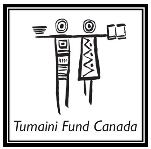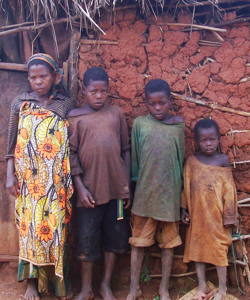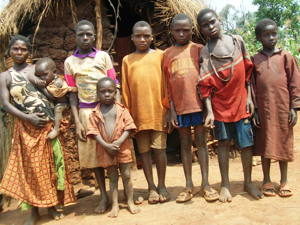 The Tumaini Fund was founded in 2003 by Drs. Susan & Douglas Wilson who are both practicing doctors in Guernsey. During a Sabbatical spent working in Kagera, the Wilsons found vast numbers of families living in abject poverty, devastated by AIDS, which left widows, grandparents and orphans, or often simply older children caring for younger siblings . The Wilsons returned to Guernsey to spread the message of this desperate situation in Kagera and so the Tumiani Fund began, with Dr. Susan Wilson MBE as the Chairman, CEO and inspirational leader.
The Tumaini Fund was founded in 2003 by Drs. Susan & Douglas Wilson who are both practicing doctors in Guernsey. During a Sabbatical spent working in Kagera, the Wilsons found vast numbers of families living in abject poverty, devastated by AIDS, which left widows, grandparents and orphans, or often simply older children caring for younger siblings . The Wilsons returned to Guernsey to spread the message of this desperate situation in Kagera and so the Tumiani Fund began, with Dr. Susan Wilson MBE as the Chairman, CEO and inspirational leader.
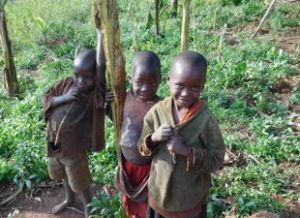 Tanzania is one of the 10 poorest countries in the world, measured by most poverty indices, with most of the wealth concentrated in the south-east of the country in Dar es Salaam and Dodoma.
Tanzania is one of the 10 poorest countries in the world, measured by most poverty indices, with most of the wealth concentrated in the south-east of the country in Dar es Salaam and Dodoma.
The province of Kagera in the north west corner of Tanzania bordered by Burundi, Rwanda, Uganda and Lake Victoria is the furthest from the sources of wealth.
AIDS widows and orphans are the poorest in this community, thus the poorest of the poor.
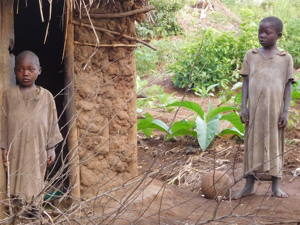 In Kagera, the average life expectancy is 43 years. Most families live by subsistence farming, growing their own food and selling any excess produce at the local market for an average income of just $110 per year. This is an unpredictable way to live and support 6-8 family members, especially with climate change and unpredictable rains.
In Kagera, the average life expectancy is 43 years. Most families live by subsistence farming, growing their own food and selling any excess produce at the local market for an average income of just $110 per year. This is an unpredictable way to live and support 6-8 family members, especially with climate change and unpredictable rains.
For AIDS widows and orphan children, even subsistence farming is unattainable, and they face starvation and severely
difficult living situations.
ORPHANS:
Children are AIDS orphans if one parent has died from AIDS. When one parent is affected, the other parent will almost certainly become ill. Tumaini endeavours to lengthen the parents time with their children, working with the families to improve their health and living conditions. The parents have the reassurance that, after their death, their children will continue to be cared for by Tumaini and the children’s rights to their parents’ small-holding will be promoted as a child-headed unit.
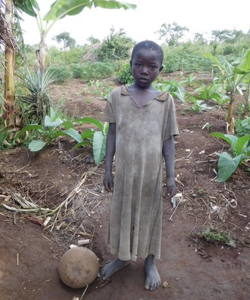 Tumaini does not run orphanages- for a child who has lost its parents, an orphanage far from home and family is another tragic loss. Tumaini orphans are cared for in their own communities by their own people who culturally adopt orphans into the wider family. The AIDS pandemic and huge number of orphans needing care, overwhelmed the remaining adults and Tumaini is providing the means for this caring society to support its own orphans.
Tumaini does not run orphanages- for a child who has lost its parents, an orphanage far from home and family is another tragic loss. Tumaini orphans are cared for in their own communities by their own people who culturally adopt orphans into the wider family. The AIDS pandemic and huge number of orphans needing care, overwhelmed the remaining adults and Tumaini is providing the means for this caring society to support its own orphans.
The head of the family may be an ailing parent already infected with AIDS, a grandparent, an aunt or uncle, a family friend, or the oldest sibling who should be at least 16 years old.
Education is the only way to provide new opportunities and options for the future, and Tumaini is working to provide this for both children and adults.
MALARIA:
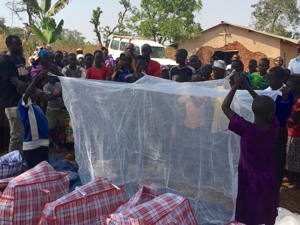 This is the biggest childhood killer in Sub-Saharan Africa. Repeated episodes of malaria threaten the lives of immuno-compromised parents. Mosquito nets are a basic provision given to all Tumaini orphans and families. They are taught proper usage and care of the nets.
This is the biggest childhood killer in Sub-Saharan Africa. Repeated episodes of malaria threaten the lives of immuno-compromised parents. Mosquito nets are a basic provision given to all Tumaini orphans and families. They are taught proper usage and care of the nets.
